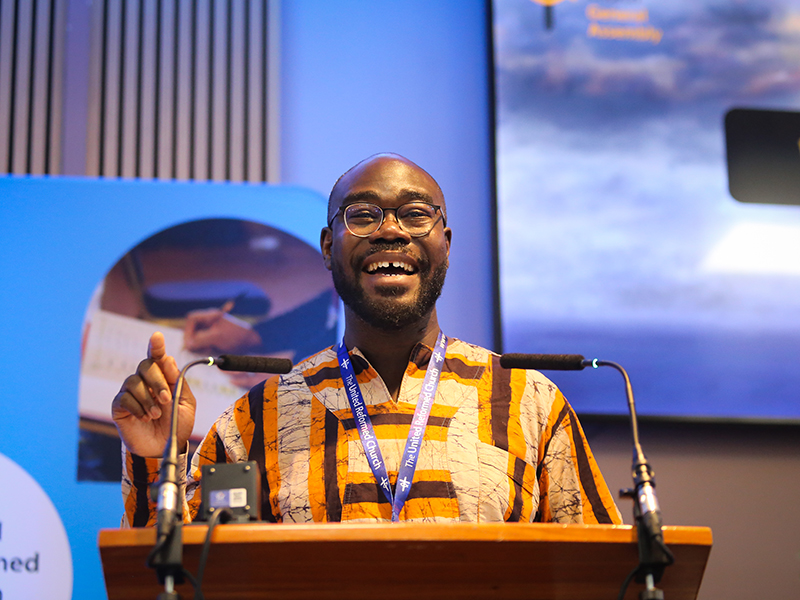Day two of the URC 2024 General Assembly continued at The Hayes Conference Centre in Swanwick on 13 July.
Worship and Bible study
“God has spoken; God is still speaking,” Karen Campbell, Chaplain to the Moderator told General Assembly. She and fellow chaplain the Revd Stephen Ansa-Addo were leading worship on the second morning of Assembly.
Karen reminded Assembly that God saw all of creation and said it was good. This means that God is in every part of the world, not just ours. She asked members to call out their heart languages, which included Welsh, Urdu, French, Yoruba and Kerala.
Stephen gave Assembly another question for chat and for the QR code cloud: “What is working?” Answers in the cloud included: youth, lay preaching, resource sharing.
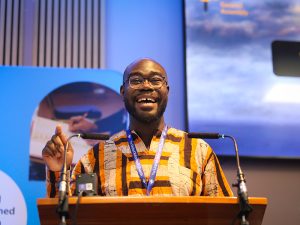
This morning’s preacher was the Revd Dr Gordon Cowans, Moderator of the United Church in Jamaica and the Cayman Islands, one of the ecumenical guests at Assembly.
Dr Cowans began by celebrating the relationship that had developed between his church the URC. It is “so beautiful”, he said, a “wonderful spirit of support, solidarity respect for who we are.” He added, “We are on a pilgrimage with you towards reconciliation and hope”.
Picking up on this year’s theme of innovation, Dr Cowans told the URC: “You are clearly a people gathered to move by the spirit of God.”
He also picked up on the text, “You have heard it said…” (or as it might be put in Jamaica, “Long time people used to say”)
The text raises the question: Did you really hear what they said? You hear when you actively listen.
Dr Cowans talked of his dealings with First Nation people. “God in God’s own way spoke to them in their worldview and spirituality which saw the sacred in all things.”
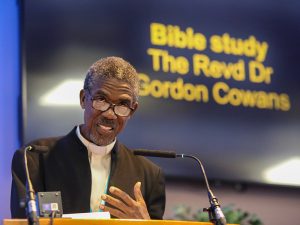
When Jesus says, “You have heard it said” he is not contradicting but offering enhanced wisdom. The old was incomplete, but it is the foundation for what you are now building. Dr Cowans quoted Marcus Mosiah Garvey: “A people without knowledge of their past history, origin and culture is like a tree without roots.”
He asked what meaning from the past we want to preserve for the benefit of the next generation.
Dr Cowans concluded by asking: what must today’s church not lose for the sake of the future?
One thing is that we must not lose faith and the urge to pass it on. Our faithful ancestors could not see the change we are privileged to live in. We must express our faith in such a way young people see it is worth their attention.
Another essential is love. Dr Cowans quoted Stevie Wonder: “Love’s in need of love today, don’t delay, send yours in right away.” He urged the URC not to lose our first love, and to send our love into this world.
He urged the URC to remain alert to the needs of others, and to guard carefully a sense of hope and expectation. “The cause that we are called to is bigger than us,” he said. “You and I working together can contribute to God’s better world.”
Presentation of candidates for GA Moderator 2025-2026 and vote
There was just one nomination for Moderator of General Assembly 2025-2026: Catriona Wheeler, who was introduced to General Assembly by the Revd Nigel Uden, acting Moderator.
Catriona is an Elder and the Church Secretary of Trinity United Reformed Church, Lincoln. She is also a worship leader and Stepwise student.
A lay member of the URC, Catriona is a lawyer and is trustee to two local charities which benefit people in Lincoln. She serves the wider URC as Legal Adviser to the East Midlands Synod, as a director of East Midlands Synod Trust and as Chair of the United Reformed Church Trust.
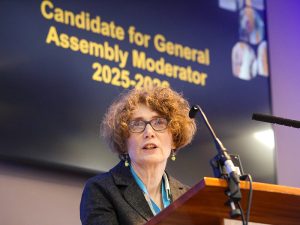
Catriona was invited to address the Assembly – a moment, the Moderator said, for Assembly to discern and affirm a sense of call. She spoke about growing up in the URC and about always being drawn back to the denomination. She became an Elder aged 28 and has since taken up a wide range of different roles.
She said that each role opens her eyes to the richness of skills and talents being offered in God’s service and observed that “we don’t bury any of our talents”. A good proportion of her work as a solicitor and Notary Public is for a wide range of charities. Catriona said this allows her to feed in her own experience but also to have an experience of wider life that she can feed back into her local church. Her life in the Church is a journey, she concluded, “and I journey with you”.
In response to a question from the Moderator, Catriona reflected that we sometimes dwell too much on what is bothering and bewildering in the world around us. “We can focus so much on this that we don’t focus on the light areas – we see only the darkness.” She said that as Moderator she would remind the Church that God sheds light on the darkness. She recalled that the author Terry Pratchett writes about “light chasing around the world following the darkness – light is coming all the time”.
The General Secretary then said that, should Catriona be elected, she will step down during the coming year as Convener of the United Reformed Church Trust Company, to avoid any conflicts of interest.
Assembly members submitted their votes for or against the election of Catriona Wheeler, the result to be declared on Monday.
Session three
Mission
Paper I2: Environmental Policy review
The Mission Committee Convenor presented Resolution 36 to Assembly and explained that the purpose of the paper is one of encouragement. The Convenor began by thanking the Net Zero Task Group for its work and commitment in trying to encourage the Church to reduce carbon emissions to net zero by 2030, a goal decided upon at General Assembly 2022.
The Convenor shared what she called “good and bad” news explain that it is achievable to reduce carbon emissions across the whole of church life – that all can play a part in that – and that it is potentially achievable to bring General Assembly’s committees and the bodies under its control to net zero emissions of greenhouse gases by 2030.
The not so good news however, is that having carried out an assessment, the task group has determined that it is unachievable to reach net zero across the whole of church life by 2030, set out on page two of the report.
Encouragingly, most Synods now have an appropriate environmental policy in place.
A huge challenge is buildings and finance that some buildings are simply not energy efficient and making changes can be extremely expensive, and the money is just not there to take the action wanted. Creative and radical thoughts are welcomed, thus explained Revd Philip Brooks when he spoke, what that the paper essentially asks for is the sharing of good practice.
Resolution 36 requests Synods and related Trust companies to report annually on their progress in reducing carbon emissions, not intended as an additional burden, but rather as an opportunity for progress to be assessed.
During the clarification and discussion phase, points were expressed that the action requested felt like an additional burden although it might not be intended to be one; on whether synods had been consulted in terms of the feasibility of the request and timescales, what would the continuing work of the task group if the resolution passed, and that the paper needs to be clearer in outline exactly what everyone needs to do progress the goal of net zero by 2030 further; and also that net zero doesn’t exactly mean no emissions, it means lowing emissions to such a point against the baseline.
Following responses to these points and an amendment in regards to a pragmatic point made about the difficulties synods would have in reporting back in March, the end of the financial year where financial teams will have their hands full with end of year accounts etc, and after it was further explained that the purpose of the resolution is to encourage action rather than focus on targets, and it’s about encouraging synods to report on progress, the resolution was passed.
Paper I4: Seven point plan
“Let us not grow weary in doing what is right,” said the Convenor of Mission Committee, introducing the report from the Legacies of Slavery task group.
Tribute was paid to the work of the group.
The Secretary for Global and Intercultural Ministries, told General Assembly that the work is progressing well. The anti-racism training provided by Professor Anthony Reddie for those in positions of leadership in the URC has been very well received, and the Secretary said the group look forward to the insights that are emerging making a difference to who we are as a Church.
The Secretary drew Assembly’s attention to the regional project to provide mentors to young black men, which the Revd Les Isaac, founder of Street Pastors, has offered to assist.
The work with global partners which led to the ecumenical pilgrimage to Jamaica in April to deliver the URC’s confession and apology was also mentioned.
The Secretary added: “I confess, I speak not just as member of the task group, but as someone who knows it because it is my life.”
The report also covers the task group’s support for the New Free Village movement for land redistribution in Jamaica, and its work with the Churches’ Reparations Action Forum (Jamaica), which has a seven-point plan for reparations.
One question from the Assembly was about how the seven-point action plan sits with the CARICOM [Caribbean Community] ten-point plan for reparatory justice, a focus of earlier stages of the legacies of slavery talks. Karen said that there was no contradiction between them.
Another member thanked the Moderator, the Revd Dr Tessa Henry-Robinson for the way she responded to criticism of the URC’s apology published in The Guardian in June.
Session four
Moderator’s Address
The Acting Moderator, the Revd Elizabeth Welch, the first female minister to be elected Moderator of the General Assembly, introduced the Revd Dr Tessa Henry-Robinson, the first Black and Ethnic Minority female Moderator of the URC Assembly.
Thanking those who had supported her in the role, Dr Henry-Robinson said the congregation of St Andrew’s Brockley, who “dared” to nominate her to be Moderator, had taken a bold step. She described it as a radical move, “an act of discipleship love that I sorely needed; that other minoritised women needed and continue to need; and I believe the URC needed to see and be part of, if change is to come”.
However, while it is rare for someone who “looks like her” to be in such a role, colour is not Dr Henry-Robinson’s driving concern. Rather, it is love and justice. She said that in the warm words she received as she travelled across the UK, and in the many duties she undertook, she observed “the potential we possess to flourish”.
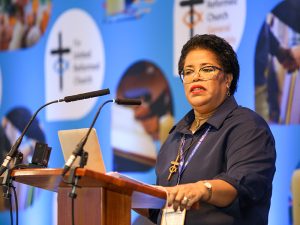
At the same time, she said there is a brokenness within the URC arising from a reluctance to be bold and take risks on people “who are seen as other”. The “discipleship love” that Jesus talked about involves selfless service to the world. She said the URC’s identity as united and reformed is still a work in progress (“we haven’t sown it up and made the dress”), and she pointed Assembly back to the path of ten statements set out in the URC’s vision 2020 document – to include diversity and welcome, justice and peace, and continue to develop our anti-racist identity. How, she asked, can we discipleship love part of our script?”
Dr Henry-Robinson identified as key barriers when we fail to see and celebrate the rich diversity God has created, and when we refuse to acknowledge the identity of others. “For example, when we claim to be colourblind, not only do we cause immense pain, we are also ignoring the unique experiences and perspectives of others, and of God’s wider creation. She said it is too easy to “bandy around” our belief that God created humankind in God’s own image. We must educate ourselves. “I’m tired of people saying, ‘I didn’t know’.” Trusting the Holy Spirit, we need to pursue a course of self-education, engagement and honest conversations, and be intentional about seeing God in everyone.
Dr Henry-Robinson encouraged the youth representatives, especially, to acknowledge, advocate, and act. “Do not let anyone impose their views on you because you are young, but set an example in speech, conduct, faith, and love … Because of who you are, I am not worried about the future of the United Reformed Church. She said we must continue to remould the Church “into its true identity”.
The Moderator concluded by returning to the words of Micah: “In everything we do, we are required to act justly, love mercy, and walk humbly with our God. And we can do this together.”
Faith Wills
A short video on the Faith Will initiative was shown to Assembly by a Christian Aid representative. The video can also be watched on the URC’s YouTube channel.
Faith Will is a pioneering initiative, launched last year by Christian Aid, and involved the Church of Scotland, Church of England and the Quakers. This year, they are joined by the URC.
The aim of the initiative is to encourage congregations to sign up for free resources to hold a Faith Will moment, making it easier to talk about the power of gifts in Wills and how people’s generosity can leave a gift to their local church and Christian Aid, helping to create change in their communities and around the world.
Community Awards
Six church projects offering outstanding service to their communities were recognised at General Assembly.
Three projects won the 2024 Community Project Awards:
- The Barn Community Cafe, Livingston United Parish Church, West Lothian

- Community Food Hub, Dursley Tabernacle URC, Gloucestershire

- Food Hub, Lancaster Road URC, Enfield, London
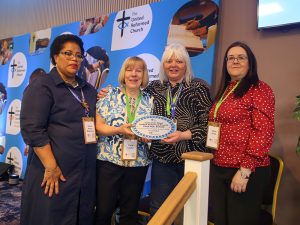
Another three community projects were highly commended:
- The Pod, Cheap Street Church, Sherborne, Dorset
- Open Church, Heaton Moor United Church, Stockport, Greater Manchester
- The Open Doors TAG Café, Dorking URC, Surrey
The award winners receive prizes of £2,000 each for their projects, and the highly commended ones receive £1,000. The community project awards have been sponsored by Congregational for 15 years, and Helen Doran, Head of Church Underwriting Operations at Congregational, presented the prizes.
Introducing the awards, the Moderator, the Revd Dr Tessa Henry-Robinson, said that for 26 years they had recognised outstanding projects demonstrating the love of God reaching out into local community. Before today, £131,000 had been awarded, she said, benefiting countless people. Today’s awards brought the total of church projects recognised to 75.
Assembly watched short videos about each of the projects, hearing from volunteers, users and ministers. The videos will be available on the URC YouTube channel.
Session five
Place for Hope
Carolyn Merry, Director of Place of Hope, shared with Assembly a short introduction on her background and the call to peace-making and reconciliation.
Place of Hope is an organisation that supports people and faith communities to navigate conflict well. It has begun a new partnership with the URC that will extend over the next five years.
The organisation was born out of a Congregational Conflict Report of the Church of Scotland (CoS) in 2008. Place for Hope was then founded in 2009 out of the serious problems of stress and conflict within the CoS at that time and the serious impact of this on the Church’s mission.
Carolyn explained that although conflict is a normal part of life and can be both creative and destructive, Place of Hope has noticed that many people – including those in faith communities – can struggle to find helpful ways to respond to change, tension and difference.
Some structures, cultures, systems and habits can make it difficult for people to hear each other well and relationships may break down. We also know though that there is much transformational potential in conflict and that in pain and conflict, there is still hope, healing and wholeness,” Carolyne said.
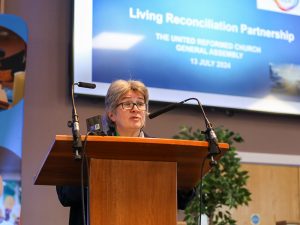
Carolyne went on to emphasis some key points: as Christians we are called to peace and reconciliation, and to conflict. The Bible is full of stories of conflict – internal conflict, interpersonal conflict, societal conflict, conflict with God and also filled with stories of reconciliation; people of faith and churches sometimes struggle with change, conflict and difference, much like everyone else, but people of faith often feel ashamed of admitting this struggle.
Place of Hope aims to build awareness that conflict is a normal part of life and that if help is sought early in a conflict there are much better opportunities for strengthened relationships, and deeper community, not to mention a reduction in pain experienced.
Although Place of Hope developed out of the CoS, it has worked independently and ecumenical in 2015 and is partnership with many different denominations and faith organisations/groups here in the UK and overseas.
The organisation provides a wide range of services including resources, training, mediation, facilitated conversations, coaching and support with cultural change, and has around 60 trained and accredited practitioners who offer mediation and facilitated conversation to people when conflict arises in congregations, synods and ecumenically.
Carolyne then interviewed the Revd David Hardman, a Methodist minister who trained as a mediation practitioner, about his role and the types of situations he has been asked to support in.
Living Reconciliation Programme Partnership 2024–2029 is the new five-year programme between United Reformed Church and Place for Hope. It will start in August 2024 and aims to facilitate a culture shift in URC congregations such that conflict is seen as a normal part of diverse communities through relationships, community and faith can be deepened. It will include an integrated programme of foundation training in conflict transformation, together with the training and support of a specialist team of mediators. This intends to release the spirit of conflict transformation and reconciliation in the culture, systems, mission and ministry of the URC.
The partnership will begin with key members of the URC and Place of Hope working together to develop a five-year programme plan for approval by the Partnership Steering Committee in November 2024.
Finance
Paper G2 Stipendary Ministers Number
In response a resolution to the 2023 General Assembly, the Finance Committee defined a process capable of linking stipendiary ministry costs to Maintenance of Ministry (M&M) receipts in a fair and transparent way.
Stipendiary ministry in the URC is funded through a covenantal relationship between members and the Church. Church members pay into the M&M fund according to their ability to pay, and receive ministry according to their needs, moderated by the total ministry available to the Church.
M&M receipts funded 309.76 FTE (Full Time Equivalent) ministers at the end of 2022, and 289.2 at the end of 2023, giving an average for the year of 299.5.
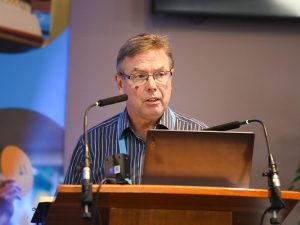
The ‘direct costs’ were listed in the report as: stipends and allowances £9,096,000; pension costs £2,268,000; National Insurance costs £909,000; allowances £148,000; housing costs (for centrally deployed ministers) £56,000; other costs (including pastoral supervision) £48,000 – a total of £12,525,000.
For the purposes of this paper, the costs for 2024 were inflated by 5% (the stipend increase agreed for 2024), giving a predicted cost per minister of £43,910.68.
The target for the end of 2024 would be 285.5 FTE ministers, a reduction of 4 on the December 2023 actual.
Lythan Nevard said really difficult decisions were having to be made in regard to numbers and that the system was close to breaking point. What is the minimum level of ministry, and how can we help people hear the call, Lythan asked.
Laura Everard asked what the decline of ministers had been and what extra measures might be needed to stop this. Nicola Furley-Smith replied that the decrease had been 3% and is now 4%.
General Assembly adopted the resolution.
Paper G3 Annual Accounts
Alan Yates, the United Reformed Church Treasurer, presented URC Trust accounts for 2023 to General Assembly. He pointed out that it is not up to Assembly to approve, the accounts, the Trust having already done so. The resolution to note the report was quickly passed.
Paper G4 Energy Crisis
The Finance Committee asked General Assembly to approve the closure of the Energy Crisis Fund and to return the unused balance of around £1.79m to the URC’s General Funds.
In 2022-23, the URC Trust responded to the cost-of-living crisis and, in particular, high energy costs by setting aside £2m for a designated fund to assist churches with their energy bills. The aim was that this fund would work alongside synod funds to help the whole Church.
Only one synod availed themselves of this fund, and consultation with synod treasurers suggests the need for such a fund is not there to the extent originally expected. In addition, there is currently a Church Buildings Fund held centrally with a substantial balance, and a number of synods also have their own building funds to assist with making grants for such work.
The Committee argued that the unspent balance of the fund could be returned to the general funds of the URC. This would help the URC Trust meet its target level of reserves.
During discussion, Mr Alan Yates, the Church’s Treasurer, indicated that there are a number of pockets of money around the Church that could be consolidated.
The Assembly voted to close the Energy Crisis Fund as proposed by the Committee.
Paper G5 Legacies of Slavery
The URC has agreed to establish a fund to cover the operational and project costs of its Legacies of Slavery work.
Having considered the URC’s context and financial position, a target of £1m was assessed as a fair figure when considered against the Church of England’s response (£100m) which, while not a perfect or easy comparison, is the only currently available yardstick.
The General Assembly agreed to reallocate the energy crisis fund back into general funds; transfer £250,000 into the Legacies of Slavery Fund; and seek contributions from Synods to reach the target of £1m.
Romilly Micklem said that ringfenced funds could have knock-on effects for the rest of the church.
Gale Richards, the Baptist Union ecumenical representative, said that a fund was a bold and positive step, which the union hadn’t done when it made its apology in 2008.
The resolution was passed.
Session six
Ministries
Paper H3 Pastorates & Scopings
The paper from the Ministries Committee set out what should happen when a 100% ministry was not sustainable, and it was necessary to reconfigure the scoping without needing to wait for the minister to move on.
On occasions, pastorates or projects, and therefore ministers, find themselves in a position where there needs to be a reconfiguration. Normally, this would happen where one or more Church Meetings in a multi-church pastorate made the decision to close.
The effect of closure may be that a 100% scoping cannot be maintained in the long term and, unless the pastorate can be reconfigured to a 100% scoping, the Call to the minister has, in effect, ceased.
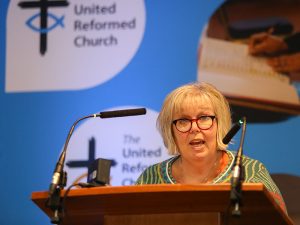
The options open to the minister in that situation are to either take a reduced scoping and a reduced stipend, or to come back onto the Moderators’ List to seek a Call to a new pastorate.
If the Call to a minister is affected where more than one church closes, the Synod Ministries Committee (or equivalent) will explore whether the closure does make 100% scoping for the pastorate unviable and, if so, whether it is possible to reconfigure the pastorate.
Trials in two Synods had taken place.
Clarification concerned around the possible impact on those not on a full stipend and where does LEPs fit into pastorates mentioned in the paper. It was explained that LEPs are very important but that the process concerns how synods would manage when pastorates need to be refigured and rescoped.
Geoffrey Clarke encouraged support for the paper as it was ‘a lot better than what we hadn’t got already.’
Questions of pastoral care for ministers, and how prescriptive the process could be given the structure of the Church. One minister didn’t feel the process was caring. John Bradbury said that the Pastoral Reference and Welfare Committee would continue stipend support in nearly all cases.
Accessibility of ministerial housing was also raised. Elaine Hutchinson wondered if this would put ministers in a vulnerable position
Steve Faber affirmed what John Bradbury has said and said that there was no guarantee for a job for life. “Ministry begins when we are called, and there is no promise that there is always a ministry for us. As the Methodist Covenant Prayer says, sometimes we are called to work and sometimes we are called to be laid aside. There is an element where we have to trust God in this.”
After changes to add the words stipendiary support, and a change to the time periods, the resolution was adopted.
Paper H9 Withdrawal of Call
General Assembly was invited to agree additions to the URC Policy on Withdrawal of Call, which was adopted by General Assembly 2023.
There were three additions to the paper:
- Clarification that, in most cases, a minister’s call will come to an end when the minister accepts a call to another pastorate, post or partnership.
- Clarification about what happens, when there have been relationship breakdowns, to ensure complaints against a minister are not spurious.
- To confirm additional leeway, up to six months, for synods and pastorates regarding the length of time a minister and their family may remain in the manse after the withdrawal of Call.
A further addition was made to reflect changes arising form an earlier debate.
Resolution 29 was carried unanimously.
Paper H10 Synod Mod process
The Ministries Committee brought processes for the Nomination and Appointment of Synod Moderators and other General Assembly roles reserved for Ministers of Word and Sacraments.
The Convenor of Ministries, Mary Thomas, said the Nominations Committee had raised a question of diversity in panels convened to make these appointments. The revised processes reflect this need, including a requirement that panel members should undergo anti-racism training and unconscious bias training. This latter point was picked up with enthusiasm by the Church of England representative, who also asked whether broader diversity training would be included. Ms Thomas said it would. Another speaker said that disability bias sometimes arose, also, and asked the Committee to take this on board.
Concern was expressed that only those not working would have the time available to do the work required by the panels, which are to be reduced in size. This issue was reinforced by a lay person who has sat on panels but now has a full-time job. However, the General Secretary said that a smaller panel would be able to achieve a more effective overview of appointments as a whole, better ensuring the required diversity.
Responding to a youth representative’s concern about removing the fixed-term requirement, the General Secretary said that if a candidate is asked whether they can fulfil a complete term, this implicitly raises a question about the age of the candidate – not something the Church could defend.
The Convenor of Nominations was concerned that the new processes wouldn’t change what she suggested has been a recent pattern of white, middle-aged males being appointed as synod moderators. The Committee Secretary reassured her that, after the resolutions had been agreed, there would be further consultation on the details, including with Professor Anthony Reddie, who is delivering anti-racism training across the URC.
A number of points were picked up by the Committee Secretary and the Moderator assured Assembly that the committee would consider all points raised in the debate.
Assembly passed Resolutions 30 and 31 by a large majority; 32 passed unanimously. Resolution 33 fell. Resolution 34 was carried.
Paper H5 Local Mission and Ministry Review
Mary Thomas, Convenor of the Ministries Committee, introduced proposals for revising the Local Mission and Ministry Review (LMMR).
LMMR was introduced in 2008 as a tool for churches to have an annual reflection on the direction they are going in, and to help minsters review their own call and service. However, Mary said, LMMR has not had the role that was hoped for. That is partly because URC ministers now have supervision, and partly because ‘it became people-hungry, difficult to implement and onerous.’
Nevertheless, she said, it is still used effectively in some places.
So the Ministries Committee were presenting a new, light-touch version of LMMR, which will now be an annual discussion around four questions:
- What do we do?
- How do we do it?
- Whom do we do it for?
- What value are we bringing?
The resolution to adopt the revised LMMR and commend it to local churches was passed.
Paper H7 Guidelines on Elders in Local Leadership
Mary Thomas, Convenor of the Ministries Committee, presented proposed guidelines for Elders in Local Leadership.
In 2008, the Church introduced proposals for churches to have a local leader working in partnership with the elders’ meeting, leaving it to synods to make arrangements and oversee the work. Some synods have implemented Local Church Leaders but, there is a concern that there is little accountability.
‘For the sake of the church and for those to whom they minister,’ said Mary, ‘levels of accountability and support need to be put in place which are consistent across the denomination.’
This is the aim of the proposed guidelines, and the resolution to adopt them was carried by General Assembly.
Reporting team: Andy Jackson, Ann-Marie Nye, Steve Tomkins, Laurence Wareing. Pictures: Chris Andrews

